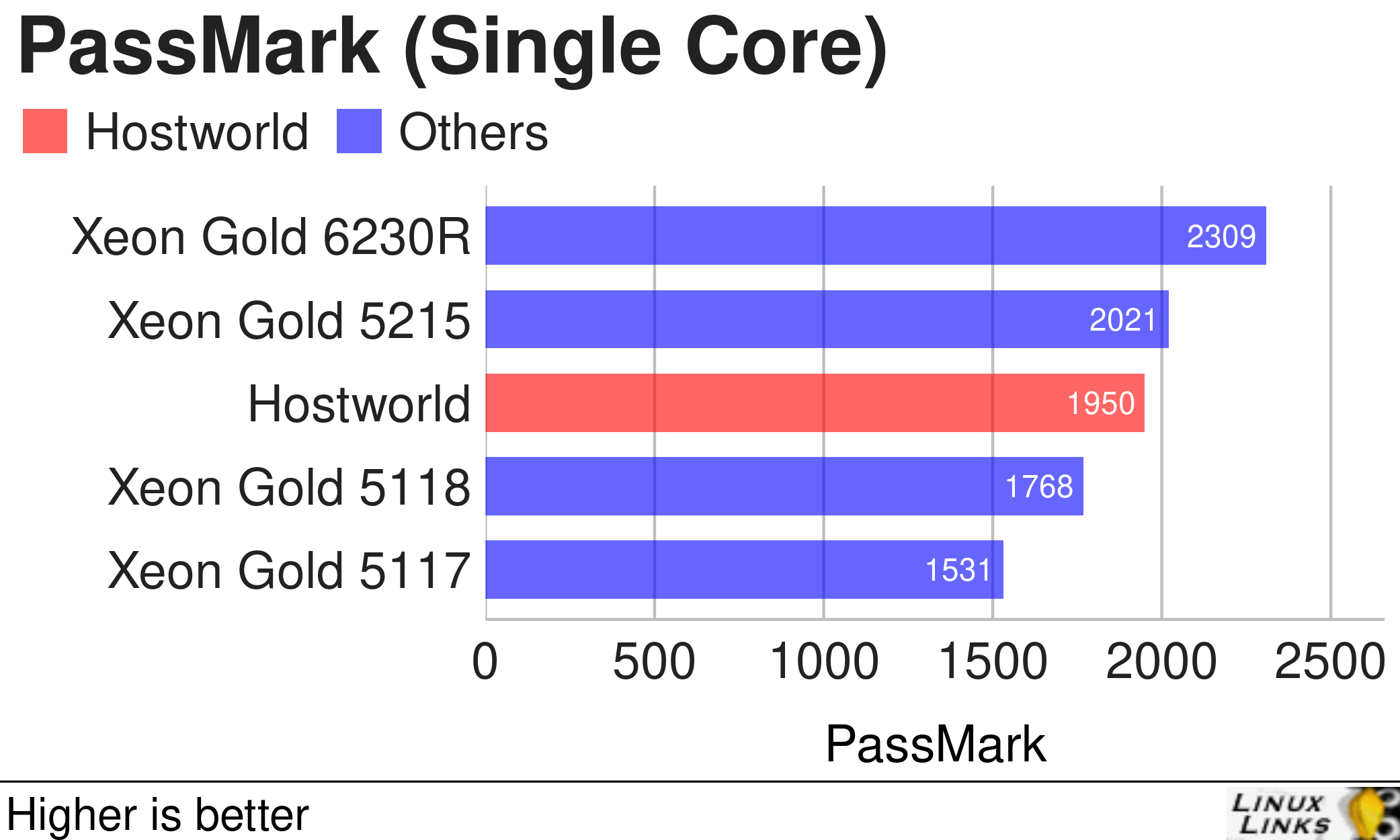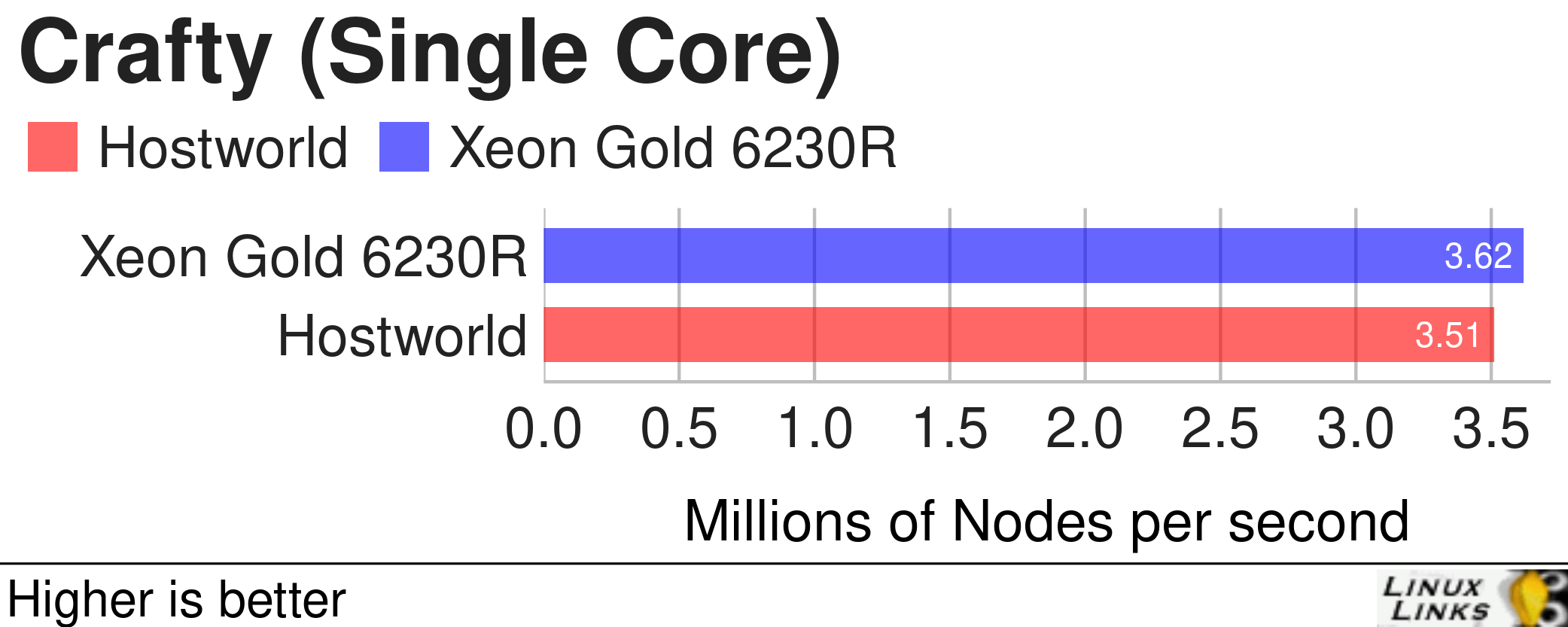Last Updated on October 18, 2022
CPU
The number of cores required in a VPS is related to the types of load that will run on the server. Most applications used in typical servers scale very well with an increasing number of cores although that’s not always the case.
The plan we’re reviewing offers 4 vCPUs. The CPU running on the physical machine is a dual Intel Xeon E5-2699 v4. That processor was released in 2016. It has 22 cores and 44 threads with a base frequency of 2.20 GHz and a 3.60 GHz turbo frequency. How does this processor compare to other processors designed for servers?

While the physical CPU in the Hostworld VPS is 4 years older than the much more recent Xeon Gold 6230R, single core performance is comparable. And single core performance is quicker than some Xeon Gold processors.
We ran a few CPU benchmarks on the VPS. Here’s an example comparison between Hostworld’s E5-2699 v4 against the Xeon Gold 6230R.
Crafty is a chess program directly derived from Cray Blitz, winner of the 1983 and 1986 World Computer Chess Championships. This is a benchmark looking at the CPU’s performance through a chess benchmark.

As you can see, there is negligible difference. The fact that the CPU in the VPS is 4 years older shouldn’t impact on performance for many use cases.
We ran into an issue running some benchmarks on the VPS triggering Hostworld’s CPU utilisation policy. We’ll elaborate.
Remember that with a VPS you are sharing the resources of the host server with other users. VPS providers often have policies about excessive CPU utilisation (and network resources). Very few VPS providers detail their policy of ensuring all users of a server receive their fair share of resources. VPS providers may throttle the CPU if a user uses it ‘excessively’. How ‘excessive’ is defined is very much cloak-and-daggers.
Hostworld have a CPU utilisation policy. But, unlike other VPS providers, they actually explicitly share that policy in their Terms of Service on their website. It’s transparent how they define excessive CPU utilisation, the CPU throttle penalty that applies and for how long that penalty applies. That deserves our praise even though the penalties applied seem somewhat disproportionate in some situations. It would be interesting to test whether reducing the throttle penalties would have any adverse effect on the performance of the server for others.
This type of public statement should definitely be adopted by all VPS providers. Customers deserve to know this type of policy prior to signing up. We’ve raised live chats with a few providers who claim they don’t throttle vCPUs in any way, yet tests from users indicate otherwise. Any type of regulatory enforcement seems unlikely considering how feebly many governments (including the US and UK) tried to stop mobile phone carriers from lying about “unlimited” data plans.
Next page: Page 3 – Memory, Disk, Network
Pages in this article:
Page 1 – Introduction
Page 2 – CPU
Page 3 – Memory, Disk, Network
Page 4 – Admin UI
Page 5 – Summary

You are right about availability guarantees. I always ignore them.
For example, I see some VPS providers promise 99.999% availability. Pure advertising baloney. If huge multinationals like Meta and Google can’t deliver that with their own platforms, there’s no way a VPS provider will do it.
And when they don’t deliver the ‘guarantee’ what actually happens. A tiny refund amounting to nothing.
Availability:
99.9% – 8 hours 45 minutes 56 seconds downtime per year
99.99% – 52 minutes 45 seconds downtime per year
99.999% – 5 minutes 15 seconds downtime per year
Facebook, WhatsApp and Instagram had a 6 hour downtime in October 2021 alone.
I’ve never understood how VPS providers claim that resources are split over a number of physical servers. Does that really happen with CPU, memory?? Surely that’s not practical?
Fundamentally it’s possible to share CPU over a cluster of computer systems (nodes), but software running on VPS servers like KVM or VMWare doesn’t do that. It is used in supercomputers with an operating system designed for this purpose and isn’t available for general purpose use even on them.
Any marketing blurb from VPS providers claiming anything like this is just making it up. What they can do is move you easily to another server at the drop of a hat.
Good to see hostworld on this review, been using them for over 12 months and can’t fault the service.
This has given me serious food for thought as it is a way better deal than I’m getting with 2vCPU, 2GB RAM and 60GB hard drive space at Digital Ocean with a paid weekly backup for $2pm extra. I’m just going to have to set aside some serious time to plan a move as that is the more difficult part, migrating 5 or 6 running services.